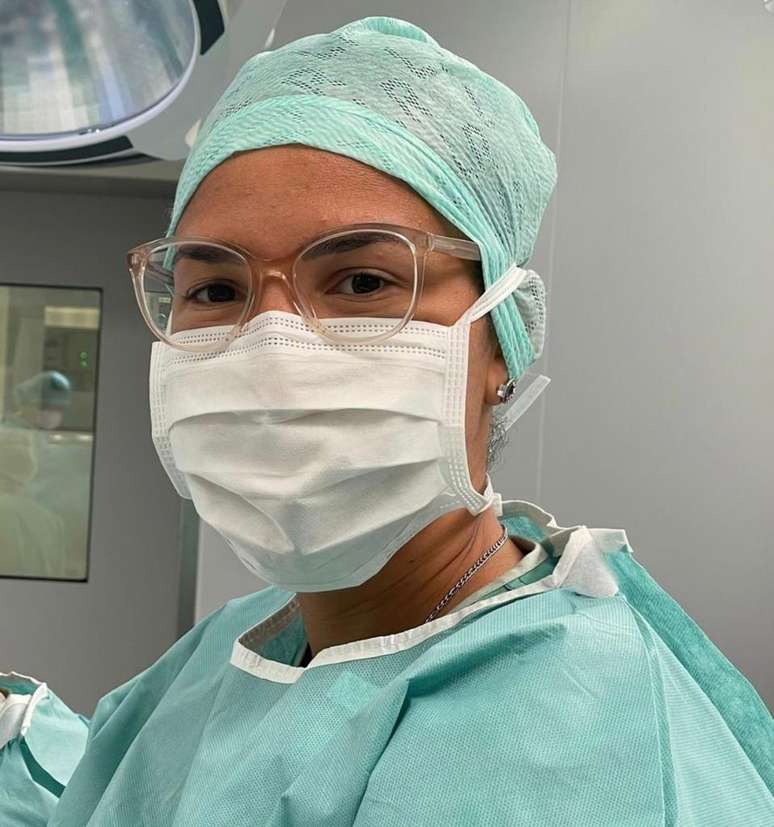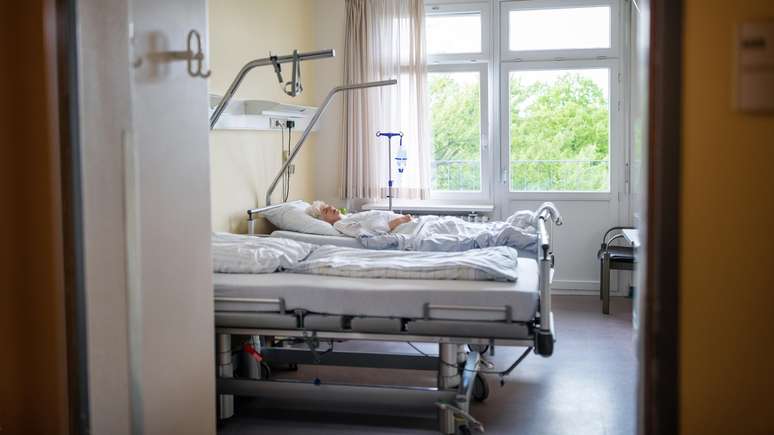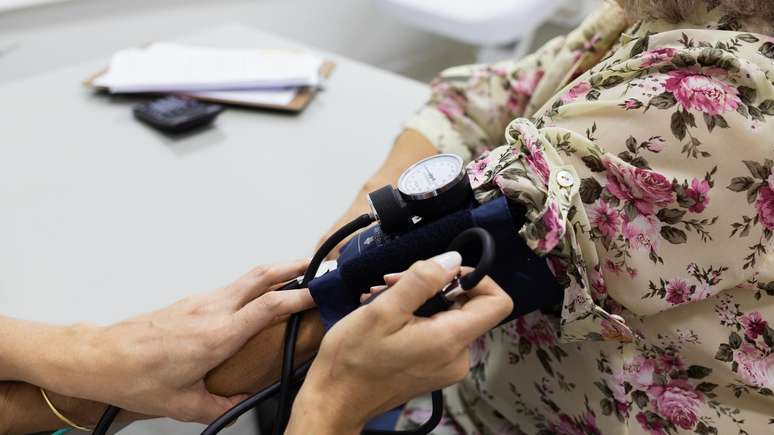The European country has had difficulty filling vacancies due to a shortage of nurses.
In 2016, Thaiza Maria Silva Farias was selected by a company in Frankfurt, Germany to work as a nurse in a hospital in Darmstadt, in the southwest of the country.
Just graduated and still without any experience in the labor market, she didn’t think at the time of living abroad. But when I saw the vacancy on Facebook, the idea of learning another language and working in Europe gained momentum.
The owner of the recruiting company traveled to Rio de Janeiro, where she lived, interviewed some candidates and selected a group to bring to the European country.
“We were one of the first groups of Brazilian nurses chosen by this company. The interviews were very random, in a group of six or seven people. Then I received an approval email,” he told BBC News Brasil.
The process went quickly and the candidates started intensive German courses, from Monday to Friday, seven hours a day. They needed to reach intermediate level 2 (B2) in the language – the minimum required for healthcare professionals in Germany – as soon as possible to validate their diplomas and start working.
The course was paid for by the recruiter, who offered a scholarship so that the selected ones could concentrate on studying the language.
This type of recruitment of healthcare professionals from abroad has become common in Germany because there is a shortage of nurses in the European country, especially in smaller cities or in homes for the elderly. And the government has had a hard time meeting this demand with only people trained in the country.

Furthermore, nursing professions in Germany tend to involve “purely professional” training, something similar to a technical course in Brazil. Only about 1% to 2% of nurses trained there have a college degree.
Proponents of a bachelor’s degree in conjunction with a bachelor’s degree in nursing point out that teaching skills help in the practitioner’s role of promoting health education for the health care team and for society at large.
In 2022, according to the Federal Statistical Office (Destatis), there were a total of 146,000 general practitioner nurses in training in Germany. About 52,300 of these apprentices started their studies last year, a drop of 7% (or 4,000 people) compared to 2021.
In all, 4,900 foreign-trained nurses worked in the European country in 2017. By 2021, that number had risen to 8,300. There is no data yet for 2022 and 2023.

In this context, the Ministers of Labor and Foreign Affairs of Germany were in Brazil on June 5, on a mission to encourage the recruitment of nurses.
In June 2022, the German government, through its federal employment agency, signed a contract with the Federal Council of Nurses (Cofen) in Brazil, which allows the country to hire these Brazilian professionals.
The German government plans to select 700 Brazilian nurses a year, according to Cofen.
Around 200 are already working in Germany thanks to this agreement and another 374 are completing German courses.
The agreement provides that the working conditions of Brazilians will follow the rules of the International Labor Organization (ILO).
“The agreement is between federal agencies of the two countries and not with private companies. (….) It guarantees job protection, fair and ethical working relationships, a guarantee for the possibility of salary growth and knowledge, as well as holidays and rest “, explains Alberto Cabral, Cofen’s legislative adviser.
Those selected will spend three years working under the supervision and guidance of their employers. After this period, a performance evaluation will decide whether they will be able to continue working in the country on a permanent basis.
How does the selection process work?
The minimum requirements for those interested are a degree in Nursing and the Cofen green card.
According to the German government, the recruitment of nurses can be done both by the state and by private companies.
In the government, the selection takes place via the Central Agency for International Employment and Specialists (ZAV) of the Federal Employment Agency, “even before the equivalence of the professional qualification acquired abroad with a reference profession has been established “.
Private companies can hire, but the German Ministry of Health stresses that applicants should choose companies with the “fair recruitment” seal.
This means that “the recruitment is transparent, understandable and fair. It also gives candidates the guarantee that the recruitment is free of charge for them, including the language courses, since all costs are borne by the future employer”.
The German government also maintains a page in Portuguese with information for interested parties.
And for the selection through the government, ZAV organizes the whole process, including instructions and translations of the necessary documentation to be delivered to the diploma recognition body in Germany.
The costs of this process are borne by the employer and a scholarship of 500 euros per month (approximately R$ 2,600) is also offered for those who are selected to study the language with full dedication.
Upon reaching level B2, the selected ones receive air tickets and accommodation in Germany until the validation of the diploma.
“Nursing specialists with diplomas or qualifications from third countries, such as Brazil, have very good opportunities to find work as medical specialists or nurses in Germany. You are very welcome,” the German Ministry of Health tells BBC News Brasil.

Salary
Salaries in Germany can be up to five times higher than in Brazil. The agreement, explains Cabral, provides for an initial payment of 2,800 euros per month (R$ 14,600,000) – net of tax deductions and health insurance -, with the possibility of career increases and promotions.
According to Farias, other factors can increase this value, such as the experience of the professional, the additional night shifts and the career plans of each hospital.
The salary can be attractive, but Faria points out that the switch isn’t easy.
When the nurse was studying German, the scholarship was only 300 euros a month (about R$ 1,500 in current values).
“I was only able to complete the course because I lived with my mother and I didn’t have many expenses. This scholarship covered some costs such as transportation, but those without support could not support themselves on that alone.”
Another important point is that before diploma validation was made official in Germany, Faria and other colleagues worked as nursing assistants. The salary for this position was 1,300 euros per month (R$6,800 in current values). The amount can be high in Reais, but it is necessary to consider that the cost of living is in Euros.
Linguistic adaptation also cannot be ignored.
“What we study in Brazil is not enough to communicate with the hospital team. We need to learn many technical terms and this can only be achieved in a specific course or in the hospital,” says Farias.
This difficulty with the language, explains the nurse, can cause tension in the work environment.
“There are people who are welcomed by the team and others who are not. [enfermeiros alemães] they don’t understand that we are college graduates and are very insecure. They think we can put patients at risk. The teams are not yet ready to receive us. They are fruitful because they expect someone who already understands and knows how to do everything, but there is a learning and adaptation process.”
How is Brazil?
Cofen data shows that Brazil has nearly 3 million registered nursing professionals, which include technicians, assistants and nurses. There are more than 700,000 nurses alone.
Destatis registers just over 1 million nurses in Germany.
The number of nurses in the Brazilian market is one of the arguments used by Germans to recruit professionals in Brazil.
Brazil’s population (over 210 million), however, is more than double that of Germany (over 80 million).
According to the German health ministry, the federal government “has made it clear” that it will hire these professionals only in places where “the training far exceeds” the needs of the local market.
The agency also claims to have carried out studies on the Brazilian labor market before starting the recruitment and to do so only with the authorization of the local authorities.
For Cabral, the recruitment of nurses by Germany “is not harmful” for Brazil.
“The number of professionals the German government wants to hire is insignificant for the number of nurses we have here. Furthermore, we train many professionals a year. And, in many cases, the salaries here are demeaning.”
In Germany, he adds, there are not only better salary prospects, but the opportunity to learn a new language and be in contact with new practices, technologies and knowledge.
Cofen was invited to visit Germany in November this year to carry out an inspection of the working conditions offered to Brazilian nurses.
“We will inspect hospitals in three cities where Brazilians work to analyze whether the cooperation agreement is respected,” says Cabral.
Source: Terra
Rose James is a Gossipify movie and series reviewer known for her in-depth analysis and unique perspective on the latest releases. With a background in film studies, she provides engaging and informative reviews, and keeps readers up to date with industry trends and emerging talents.






